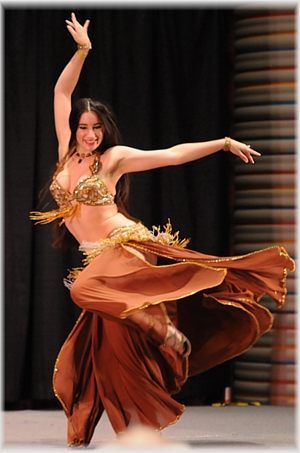But I’ve Seen So-and-So Famous Dancer Do This! I have, too. I’ve danced it. There are many excellent instructors and performers of this style in the U.S. This post isn’t about them, as these professionals clearly make it known to their students and audiences what style they are performing.
Is There a Problem With This Dance Style?
With the style, no there isn’t. The problem arises when it is copied with no context or explanation; as a result the misconception of what Turkish Oryantal dance continues. As dancers, we all know that our art form is not static – it is living, breathing, and ever-evolving. It’s just fine to dance this style, it holds a significant place in our U.S. cabaret bellydance history. Just make sure you are accurately describing the style you are dancing, and don’t call it modern Turkish Oryantal.
What’s Wrong With Dancing to ‘Rompi, Rompi’ or Other 9/8 time signature songs? Nothing inherently wrong, but keep in mind the era of this music and the its origins. By this I mean is it a folk song? Many of the AmCab-era bellydance songs grew out of the East Coast nightclubs, where musicians from many nations around the Mediterranean would be hired to play. Many of these songs, including Sisiler/Shishelai and Mastika are traditionally drinking songs, folk songs or folk song-based. But they are known by musicians from throughout that region, each having a slightly different musical twist on it depending on the country. The nightclub musicians may not always have shared the same country or spoken language, but they did share the same musical language. With this commonality of songs, dancers would’ve heard them repeatedly in different nightclubs and developed eye-catching routines to them.
However: I’ve traveled to Istanbul to study Turkish Oryantal dance yearly since 2013, and taken virtual lessons since COVID-19, and have yet to see any modern Turkish Oryantal dancer there, or instructor, dance or teach to any of these AmCab-era songs. And they are quite puzzled why American dancers do.
9/8 Time Signature is What They Call Karsilama, Right?

Well….no. 9/8 time signature is not called Karsilama.
Karsilama is, and always has been, a folk dance from the northwestern regions of Turkey. It is not Turkish Oryantal dance.
Recall our discussion above about the range of countries the nightclub musicians came from, and the folk dances they had in common…they would have recognized the common 9/8 time signature, however somewhere along the line the name of the folk dance became mistakenly used instead.
To Recap:
Modern Turkish Oryantal dance is not performing to 9/8 time signature songs like ‘Rompi, Rompi’ while swishing your skirt around. This style is a throwback to early American Cabaret dance styles from the 1960s to 1970s. If you love this dance style, great! Just call it what it is. If you love 9/8 time signatures, great! Just don’t call the music Karsilama.
Did this topic surprise you, give you food-for-thought, or give you insights into a topic you didn’t know about? Check back next month for our next blog update, and don’t forget to comment below with your thoughts – we appreciate constructive feedback!

